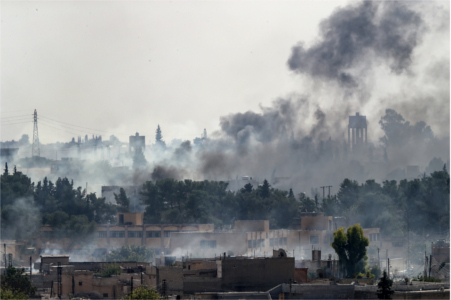
Smoke rises over the Syrian town of Tel Abyad, as seen from the Turkish border town of Akcakale on Oct. 13, in Akcakale, Turkey. The military action is part of a campaign to extend Turkish control of more of northern Syria, a large swath of which is currently held by Syrian Kurds, whom Turkey regards as a threat. U.S. President Donald Trump granted tacit American approval to this campaign, withdrawing his country’s troops from several Syrian outposts near the Turkish border. Photo: Burak Kara/Getty Images
by Chad Bouchard
OPC member and former governor Rukmini Callimachi has closely followed escalating conflict in northern Syria after President Trump’s decision to withdraw U.S. troops. She is a New York Times foreign correspondent covering Al Qaeda and ISIS, currently at home on maternity leave. Callimachi warned of a growing humanitarian crisis, and expressed dismay that Turkey’s invasion of Syria could revive ISIS and reverse hard-fought gains against the group.
On Oct. 6, the White House announced that U.S. forces would withdraw from the border to make way for a “long-planned” invasion from Turkey. Trump warned that he would “totally destroy and obliterate” Turkey’s economy if the country did anything “that I, in my great and unmatched wisdom, consider to be off limits.” With backing from Turkey, a loosely organized band of Syrian rebels linked to extremist groups, known as the Free Syrian Army, or FSA, launched an assault on northeastern Syria. The group executed Kurdish prisoners and killed unarmed civilians as well as Kurdish fighters of the Syrian Democratic Forces, or SDF.
Callimachi noted the next day that the U.S. had recently asked Kurds to remove fortifications they had installed along the Turkish border, calling the move “a whole other level of betrayal.” She also pointed out that ISIS had launched an attack in Raqqa, saying that “Many of us predicted that ISIS would be back, but I have to say I didn’t think it would be this soon.”
Callimachi also highlighted commentary from Washington Post columnist and associate editor David Ignatius, who on the eve of the pullout announcement said “Trump is opening [the] way for Turkish power grab in NE Syria that is a guarantee of future bloodshed and instability. The Syria mission was a rare success for US military power in the Mideast – now being squandered to appease Erdogan’s ambitions.” Ignatius lit the Candle of Remembrance this year at the OPC’s Annual Awards dinner to honor journalists killed in 2018, including his former colleague Jamal Khashoggi.
On Oct. 11, Callimachi rolled out a 21-part Twitter thread that included a video that the SDF sent to reporters, showing a group of ISIS prisoners escaping from the Navkur prison in Qamishlo near the Syria-Turkey border. The video showed an explosive detonation and several men running from a building. She cautioned at the time that the video needed further confirmation.
In the thread, Callimachi listed some of the most dangerous detainees now at risk of being freed, including Adrien Guihal, who claimed responsibility on behalf of ISIS for the Nice attack which killed 87 people, Canadian Mohammed Khalifa, the English-language narrator of ISIS propaganda, and Swiss Islamic extremist Damien Grivat, who is linked to attacks in Paris that killed 130 people.
“Out of this toxic soup, the US has removed from the Kurdish-run jails the ‘Beatles’ who oversaw the captivity of Western prisoners held alongside James Foley. Super. But what about the captors of Rudaw cameraman Massoud Aqeel and thousands of others?” Callimachi wrote.
Two days later on Oct. 13, she reported that an SDF commander had confirmed that the camp at Ain Issa had fallen. The facility includes a section that holds hundreds of ISIS supporters including their wives and children. “An unbelievable mess,” the commander called it.
Callimachi published a screenshot from a pro-ISIS channel on the app Telegram depicting ISIS members celebrating the liberation of their supporters at Ain Issa.
“You know that game kids play on the beach? The one where they spend all day building an elaborate sandcastle only to then stomp it to the ground? That’s our ISIS strategy,” Callimachi wrote. “While [ISIS] was not defeated, we had made significant gains. 1000s were detained. Not after today.”
Reuters reported later that the Kurdish-led administration in northern Syria counted “785 people affiliated with I.S. have escaped the Ain Issa camp following shelling by Turkey.”
The International Crisis Group said in a recent report that Turkish intervention in Syria could spark an ISIS resurgence, and warned that instability in Iraq or “spill-over of U.S.-Iranian tensions” could enable its comeback.
On the same day Callimachi tweeted that a Turkish airstrike hit a convoy of civilians, including journalists, in northeastern Syria. Several were killed, but their identities had not been confirmed. She included an image of a message from journalists working with France 2 telling colleagues they were safe.
Callimachi later appeared on Dutch television news show Nieuwsuur to talk about the U.S. withdrawal, which she said a colleague compared to the fall of Saigon in 1975. “There is no doubt that what has happened this week is an enormous boon to ISIS,” she said.
Callimachi joined The New York Times in 2014 as a foreign correspondent, covering Al Qaeda and ISIS. She has garnered three OPC awards including this year’s Lowell Thomas Award for the podcast she hosts called “Caliphate,” which also won a Peabody award in the radio/podcast category in April. She won two 2013 OPC awards for her series of stories based on a cache of internal Al Qaeda documents she discovered in Mali, and is also a four-time Pulitzer Prize finalist.
